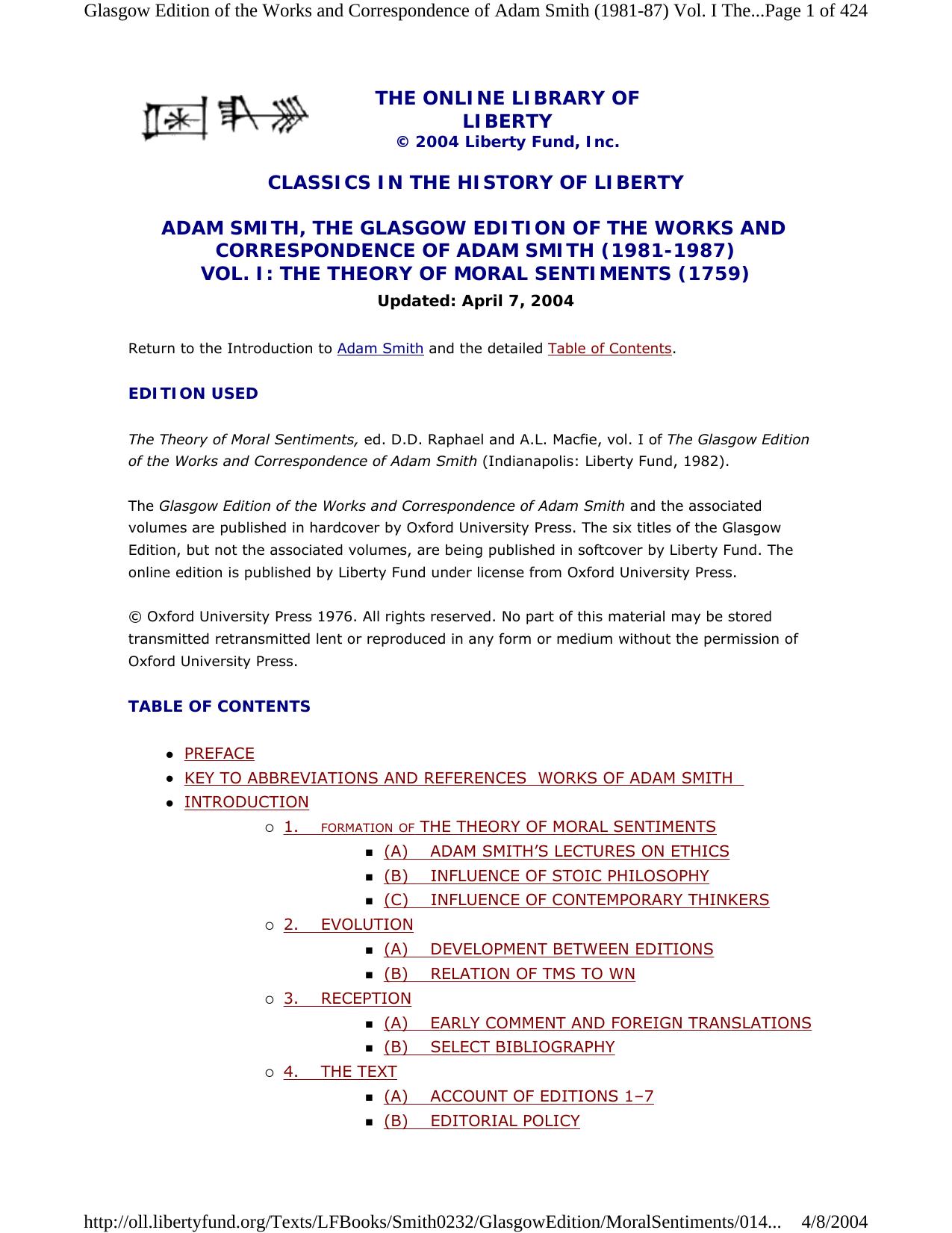The Theory of Moral Sentiments by Adam Smith

Author:Adam Smith
Language: eng
Format: epub, pdf
Publisher: Penguin Group USA, Inc.
Published: 2010-07-20T16:00:00+00:00
PART VI.
OF THE CHARACTER OF VIRTUE.
CONSISTING OF THREE SECTIONS.1
INTRODUCTION.
When we consider the character of any individual, we naturally view it under two different aspects; first, as it may affect his own happiness; and secondly, as it may affect that of other people.
SECTION I.
OF THE CHARACTER OF THE INDIVIDUAL, SO FAR AS IT AFFECTS HIS OWN HAPPINESS; OR OF PRUDENCE.
The preservation and healthful state of the body seem to be the objects which Nature first recommends to the care of every individual. The appetites of hunger and thirst, the agreeable or disagreeable sensations of pleasure and pain, of heat and cold, &c. may be considered as lessons delivered by the voice of Nature herself, directing him what he ought to chuse, and what he ought to avoid, for this purpose. The first lessons which he is taught by those to whom his childhood is entrusted, tend, the greater part of them, to the same purpose. Their principal object is to teach him how to keep out of harm’s way.
As he grows up, he soon learns that some care and foresight are necessary for providing the means of gratifying those natural appetites, of procuring pleasure and avoiding pain, of procuring the agreeable and avoiding the disagreeable temperature of heat and cold. In the proper direction of this care and foresight consists the art of preserving and increasing what is called his external fortune.
Though it is in order to supply the necessities and conveniencies of the body, that the advantages of external fortune are originally recommended to us, yet we cannot live long in the world without perceiving that the respect of our equals, our credit and rank in the society we live in, depend very much upon the degree in which we possess, or are supposed to possess, those advantages. The desire of becoming the proper objects of this respect, of deserving and obtaining this credit and rank among our equals, is, perhaps, the strongest of all our desires, and our anxiety to obtain the advantages of fortune is accordingly much more excited and irritated by this desire, than by that of supplying all the necessities and conveniencies of the body, which are always very easily supplied.
Our rank and credit among our equals, too, depend very much upon, what, perhaps, a virtuous man would wish them to depend entirely, our character and conduct, or upon the confidence, esteem, and good-will, which these naturally excite in the people we live with.
The care of the health, of the fortune, of the rank and reputation of the individual, the objects upon which his comfort and happiness in this life are supposed principally to depend, is considered as the proper business of that virtue which is commonly called Prudence.
We suffer more, it has already been observed,2 when we fall from a better to a worse situation, than we ever enjoy when we rise from a worse to a better. Security, therefore, is the first and the principal object of prudence. It is averse to expose our health, our fortune, our rank, or reputation, to any sort of hazard.
Download
This site does not store any files on its server. We only index and link to content provided by other sites. Please contact the content providers to delete copyright contents if any and email us, we'll remove relevant links or contents immediately.
The remains of the day by Kazuo Ishiguro(8969)
Tools of Titans by Timothy Ferriss(8363)
Giovanni's Room by James Baldwin(7320)
The Black Swan by Nassim Nicholas Taleb(7105)
Inner Engineering: A Yogi's Guide to Joy by Sadhguru(6785)
The Way of Zen by Alan W. Watts(6600)
Asking the Right Questions: A Guide to Critical Thinking by M. Neil Browne & Stuart M. Keeley(5756)
The Power of Now: A Guide to Spiritual Enlightenment by Eckhart Tolle(5746)
The Six Wives Of Henry VIII (WOMEN IN HISTORY) by Fraser Antonia(5496)
Astrophysics for People in a Hurry by Neil DeGrasse Tyson(5180)
Housekeeping by Marilynne Robinson(4436)
12 Rules for Life by Jordan B. Peterson(4299)
Double Down (Diary of a Wimpy Kid Book 11) by Jeff Kinney(4259)
The Ethical Slut by Janet W. Hardy(4241)
Ikigai by Héctor García & Francesc Miralles(4238)
Skin in the Game by Nassim Nicholas Taleb(4235)
The Art of Happiness by The Dalai Lama(4123)
Skin in the Game: Hidden Asymmetries in Daily Life by Nassim Nicholas Taleb(3987)
Walking by Henry David Thoreau(3952)
